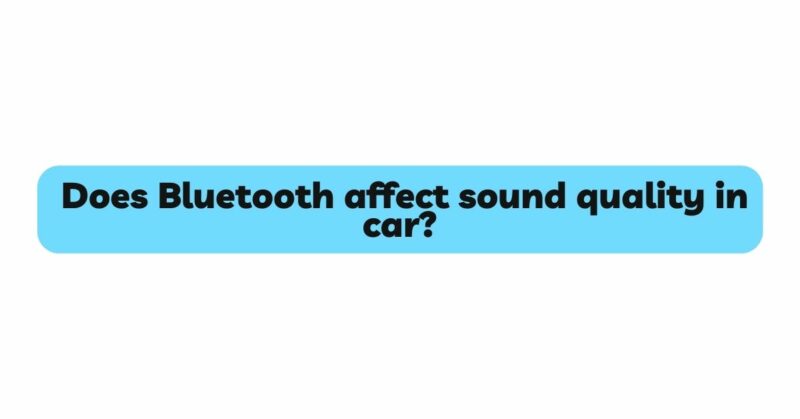The marriage of automotive technology and audio systems has transformed the way we experience music on the road. Bluetooth connectivity, a hallmark of modern cars, enables wireless audio playback and hands-free communication. However, the question of whether Bluetooth affects sound quality in cars continues to intrigue audiophiles, music enthusiasts, and everyday drivers alike. This article embarks on an immersive journey into the realm of car audio, delving deep into the nuances of Bluetooth technology and its potential influence on sound quality.
The Bluetooth Revolution in Cars
Bluetooth technology has become synonymous with wireless connectivity and convenience. In the context of car audio, Bluetooth enables drivers and passengers to seamlessly connect their smartphones, tablets, or music players to the car’s audio system. This wireless integration allows for hands-free calling, music streaming, and navigation guidance, enhancing both safety and entertainment during journeys.
However, as audio purists and discerning listeners are well aware, the convenience of Bluetooth connectivity is often accompanied by concerns about potential compromises in sound quality. This article aims to dissect these concerns, shed light on the mechanics of Bluetooth audio transmission, and evaluate whether Bluetooth does indeed impact sound quality in cars.
The Mechanics of Bluetooth Audio Transmission
To comprehend the potential impact of Bluetooth on sound quality in cars, it’s essential to understand how Bluetooth audio transmission works. When a Bluetooth-enabled device (such as a smartphone) is paired with a car’s audio system, the device sends audio data wirelessly to the car’s speakers.
Bluetooth audio transmission employs codecs – algorithms that compress and decompress audio data for efficient wireless transfer. Older Bluetooth codecs, like SBC (Subband Coding), often introduced audio degradation due to heavy compression. However, advancements in technology have led to the development of higher-quality codecs like aptX, AAC, and LDAC. These codecs aim to maintain audio fidelity by minimizing data loss during compression and decompression processes.
The Impact on Sound Quality
The pivotal question surrounding Bluetooth in cars revolves around whether these compression processes adversely affect sound quality. To answer this question, it’s crucial to consider the factors that influence sound quality, including frequency response, dynamic range, and signal-to-noise ratio.
Frequency Response: Bluetooth codecs aim to maintain the original frequency response of the audio signal. This means that bass, midrange, and treble frequencies should be faithfully reproduced, regardless of the codec used. However, some listeners with finely tuned ears might discern subtle differences in frequency response between Bluetooth and other wired connections.
Dynamic Range: Dynamic range, the difference between the softest and loudest sounds in an audio signal, is vital for conveying musical nuances. Compression processes in Bluetooth transmission can potentially impact the dynamic range, leading to reduced subtleties in music. While newer codecs attempt to mitigate this effect, it remains a consideration.
Signal-to-Noise Ratio: A high signal-to-noise ratio is essential for clean and accurate sound reproduction. While Bluetooth technology strives to maintain a respectable signal-to-noise ratio, wireless transmission introduces the possibility of signal interference, which can affect the overall clarity of the audio.
Real-World Listening Scenarios
The perceived impact of Bluetooth on sound quality in cars can vary based on real-world listening scenarios. In quiet environments, such as when parked or driving on smooth roads, the differences in sound quality between Bluetooth and wired connections might be more noticeable. However, the dynamic and often noisy nature of driving conditions can mask subtle differences.
Road noise, engine vibrations, and ambient sounds inside the car’s cabin can overshadow the nuances that differentiate Bluetooth and wired connections. This makes it important to critically evaluate sound quality in scenarios that closely mimic actual driving conditions.
Advancements in Bluetooth Technology
As technology continues to evolve, Bluetooth audio transmission is undergoing significant improvements. The emergence of codecs like aptX HD and LDAC seeks to deliver higher-quality audio with reduced compression artifacts. These codecs cater to audiophiles and discerning listeners who seek a more faithful audio reproduction through wireless connectivity.
Moreover, modern car audio systems are designed to integrate seamlessly with Bluetooth technology. Manufacturers are investing in optimizing Bluetooth audio playback to ensure compatibility with high-resolution audio formats and to enhance overall audio quality.
Balancing Convenience and Quality
The perceived impact of Bluetooth on sound quality in cars must be weighed against the convenience it offers. Bluetooth eliminates the need for physical cables, allowing drivers and passengers to easily switch between devices and stream music wirelessly. The hands-free calling feature enhances safety, and the wireless nature of Bluetooth complements the modern driver’s lifestyle.
While Bluetooth may not always match the pristine sound quality of wired connections, its integration into the driving experience is a key factor. For many users, the convenience and adaptability outweigh the slight differences in sound quality.
Conclusion: A Symphony of Choice and Evolution
In the symphony of car audio technology, Bluetooth represents a harmonious blend of convenience and quality. While audiophiles and sound purists may detect subtle nuances in sound quality between Bluetooth and wired connections, the advancements in Bluetooth technology are narrowing the gap. High-quality codecs and optimized car audio systems are striving to deliver an increasingly immersive and satisfying auditory experience through wireless connectivity.
Ultimately, the choice between Bluetooth and wired connections in cars depends on individual preferences and priorities. If sound quality is paramount, a wired connection like AUX might be preferred. However, for those who value convenience, adaptability, and the seamless integration of technology into the driving experience, Bluetooth is a worthy contender that continues to evolve and surprise with its ever-improving sound quality. The quest for the perfect balance between convenience and quality is at the heart of the Bluetooth revolution in car audio.


